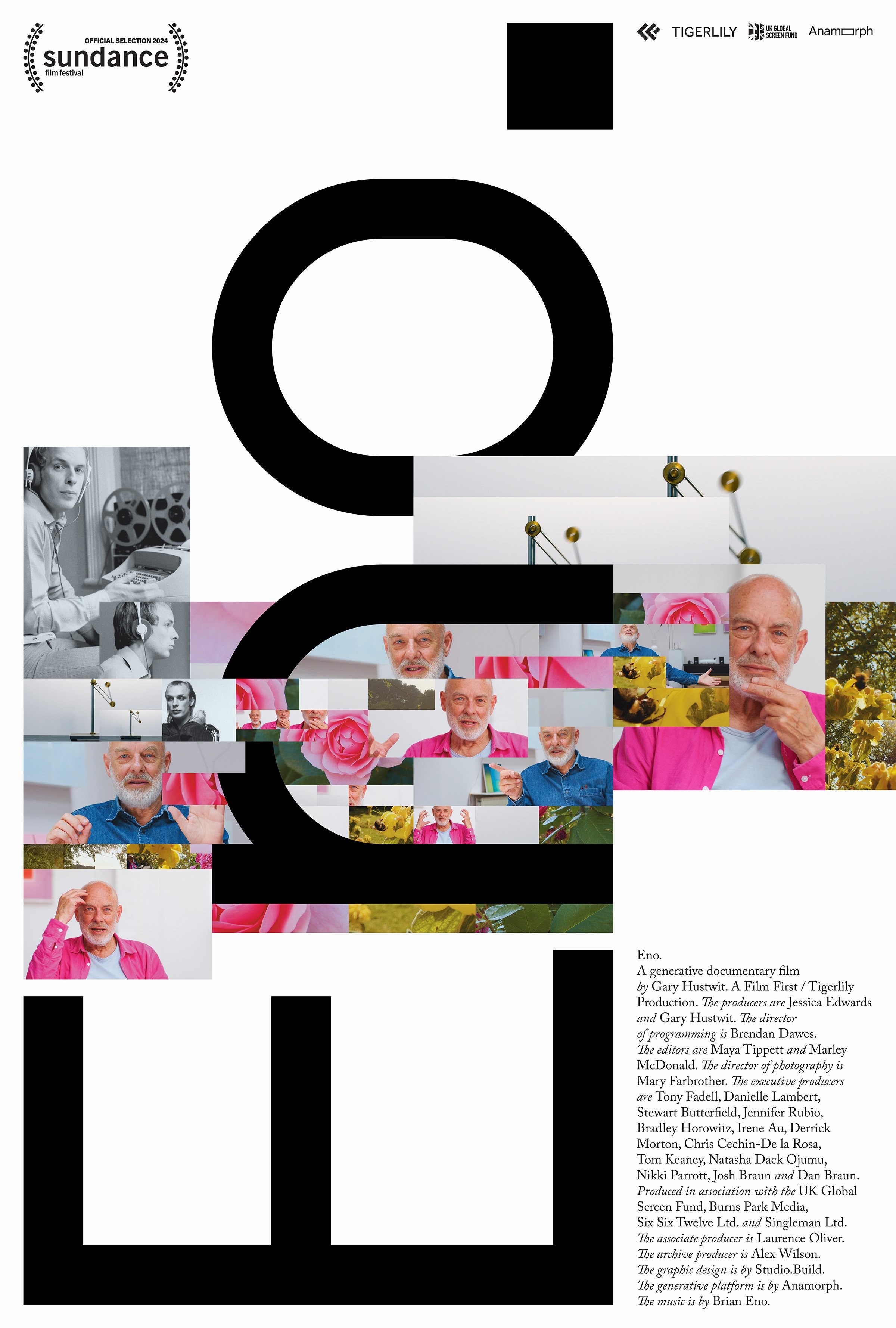The Brian Eno Documentary Is An Interesting Yet Unsatisfying Exercise
Gary Hustwit’s ever-changing, generative ‘Eno’ succeeds in concept, if not execution
In 1975, Brian Eno released Discreet Music, his first “conscious” ambient album. On the back cover, he wrote an essay that starts, “Since I have always preferred making plans to executing them, I have gravitated towards situations and systems that, once set into operation, could create music with little or no intervention on my part.” With an accompanying technical graph, he describes side A’s 32-minute title composition—a few looping melodies that alternate in and out of the foreground—as “a technological approach to the problem. If there is any score for the piece, it must be the operational diagram of the particular apparatus I used for its production.”
Over about 50 years since, Eno has further explored his interest in generative technologies, notably with his 2017 album/app Reflection, an algorithm (not artificial intelligence) with defined parameters to make music “forever” (at least as long as the app exists). Eno, the “non-musician” who’s ended up as one of modern music’s great geniuses, thinks of music as geography, as a landscape to fill out; after all, he was trained as a painter.
When director Gary Hustwit approached Eno to be the subject of his new documentary, Eno refused—until Hustwit and programmer Brendan Dawes presented the generative idea. Hustwit, who specializes in art and design documentaries (subjects include Helvetica font, office architecture, and urban design) previously worked with Eno on the soundtrack to a Dieter Rams documentary, and convinced the musician on the Eno documentary with a generative demonstration of the Rams footage.
Playing at Film Forum in New York City through at least September 5, Hustwit’s Eno draws from 30 hours of interviews and over 500 hours of other footage. Hustwit and Dawes calculate that there are 52 quintillion variations of the 90- or 100-minute Eno (lengths somewhat vary), given the amount of footage and the way it’s shuffled. The filmmakers complained to The New York Times that a film’s linearity is “obsolete,” and that a “130-year-old technical constraint” stunts the medium. Yet for all of Eno’s generative buzz, the Film Forum screenings are still from an industry-standard Digital Cinema Package; there’s just a new DCP each time. (Festival screenings had Hustwit with the custom Brain One deck, which looks like the video equivalent of a digital DJ deck.)
I saw gen.3.116 at 4:15 PM on Thursday, August 22. No matter the exact variations, there seem to be generally predetermined sequences whose unpredictability might only interest Hustwit, Dawes, and Eno. An opening montage flashes various bits of Eno’s career, then the other sequences follow, switching with a computer glitch effect as the algorithm scrapes the material. Unfortunately, the result is incoherent and meandering, a combination of interesting facts for hardcore fans (how he rejected Joni Mitchell’s idea for an ambient collaboration, how he made “Spirits Drifting” from Another Green World while in tears) to extremely obvious anecdotes that anyone spending money to see a Brian Eno documentary would already know (the origins of the Oblique Strategies cards, his idealist naivety, and his work with U2, Talking Heads, David Bowie, etc). The final result feels like shuffling a playlist, rather than sitting down to absorb a finely curated work.
For all the novel or entertaining bits—the best being Eno listening to his own work off of YouTube, but not before telling Grammarly and Vrbo ads to shut up—there’s an eternity of him talking about the same ideas he always talks about. At least his “try not to get a job” clip didn’t make it to the version I saw, but there’s all sorts of wacky choices. Is Eno talking about his great note-less lectures more important than his film music? Not really, and the documentary’s omission of Eno’s work as a film score composer (whether composing specific scores, sending out existing work for directors’ consideration, or letting directors license his music as their entire soundtracks) is quite bizarre for a theatrically released documentary. Eno’s already spent enough time talking about everything included here—why couldn’t we hear him talk about something else?
Thus, Hustwit’s documentary is neither historically informative nor engaging on its own terms, a rather aimless experiment that doesn’t work. There’s no narrative to latch onto, and the fragmentation comes across as incomplete rather than artistically intentional. Brian Eno rambles best when uninterrupted by such mandated sequences of his Wikipedia overview, and the archival footage isn’t particularly worthwhile. Rescanning all relevant materials of various source quality would be excessively expensive, and blatant macroblocking artifacts suggests that Hustwit downloaded everything from YouTube. I presume that Eno owns the material that isn’t public domain, but I’d be shocked if the team cleared everything shown here. Hopefully the copyright lawyers don’t attend the wrong screening.
It remains to be seen how Gary Hustwit and the involved production companies tackle the impracticality of bringing Eno to home video. There’s supposedly talks of a streaming algorithm that will bring continually new versions to viewers, but the expense probably wouldn’t be worth it for anyone. No matter how well the film represents Eno’s philosophy, it fails as a proper, complete portrait of him. It ends up more as a curio for Eno diehards with an easy way to Film Forum. Otherwise, just go on YouTube and watch 90 minutes of Eno talking, with his music on a playlist in the background. You’ll essentially get the same experience.







































.png)








